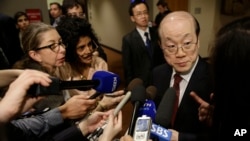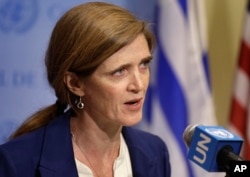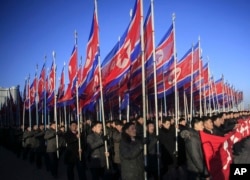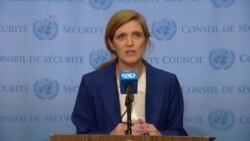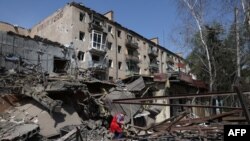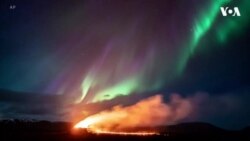ສະຫະລັດແລະບັນດາພັນທະມິດ ກຳລັງພາກັນຊຸກຍູ້ ໃຫ້ສະມາ
ຊິກຂອງສະພາ ຄວາມໝັ້ນຄົງສະຫະປະຊາຊາດ ໃນການລົງຄະ
ແນນສຽງຢ່າງຮີບດ່ວນຮັບເອົາ ຮ່າງຍັດຕິການທົງໂທດເພີ້ມເພີ້ມ
ຕື່ມຕໍ່ເກົາຫລີເໜືອ ຊຶ່ງເປັນການລົງໂທດທີ່ຈະກວດຄົ້ນສິນຄ້າສົ່ງ
ອອກທັງໝົດ ແລະຍຸດຕິການນຳເຂົ້າທຸກໆຜະລິດຕະພັນ ທີ່ອາດ
ສາມາດໃຊ້ເພື່ອຈຸດປະສົງທາງທະຫານ.
ເອກອັກຄະລັດຖະທູດ ສະຫະລັດ ປະຈຳສະຫະປະຊາຊາດ ທ່ານນາງ Samantha Power ໄດ້ສະເໜີຍັດຕິດັ່ງກ່າວໃນວັນພະຫັດວານນີ້ ຫລັງຈາກໄດ້ມີການເຈລະຈາກັນເປັນເວລາເຈັດອາທິດລະຫວ່າງ ສະຫະລັດແລະຈີນ ທີ່ເປັນພັນທະມິດໃກ້ຊິດກັບ
ເກົາຫລີເໜືອນັ້ນ.
ຈີນໄດ້ສະໜັບສະໜູນການສົນທະນາຫາລືກ່ຽວກັບການລົງໂທດຕໍ່ເກົາຫລີເໜືອ ໃນໄລຍະທີ່ຜ່ານມາ ແຕ່ວ່າຮ່າງຍັດຕິສະບັບໃໝ່ນີ້ ໄດ້ຮັບການສະໜັບສະໜູນຈາກຈີນ ກ່ຽວກັບມາດຕະການຕ່າງໆ ເຊັນວ່າ ຫ້າມບໍ່ໃຫ້ເກົາຫລີເໜືອນຳເຂົ້າຜະລິດຕະພັນເຮືອບິນ ແລະເຊື້ອໄຟລູກສອນໄຟ ຕະຫລອດທັງຊິ້ນສ່ວນຕ່າງໆທີ່ອາດນຳໃຊ້ໂດຍທະຫານ ເຊັນວ່າ ລົດບັນທຸກ ແລະອາວຸດຊະນິດນ້ອຍ.
ເອກອັກຄະລັດຖະທູດຈີນ ທ່ານ Liu Jieyi ໄດ້ຖະແຫຼງຢ່າງຈະແຈ້ງຕໍ່ບັນດານັກຂ່າວໃນວັນພະຫັດວານນີ້ຫລັງຈາກກອງປະຊຸມສະພາຄວາມໝັ້ນຄົງສະຫະ ປະຊາຊາດວ່າ ຈີນກຳລັງປະຕິບັດງານຢ່າງໃກ້ຊິດກັບບັນດາປະເທດສະຊິກສະ ພາຄວາມໝັ້ນຄົງອຶ່ນໆ ເພື່ອໃຫ້ບັນລຸໃນການທີ່ເກົາຫລີເໜືອກາຍເປັນປະເທດ ປອດອາວຸດນິວຄລຍ ແລະກ່າວເພີ້ມເຕີມອີກວ່າ ທ່ານມີຄວາມຫວັງວ່າ ຍັດຕິ ດັ່ງກ່າວຈະເປັນຜົນເຮັດນຳໄປສູ່ການມີ “ສັນຕິພາບ ແລະຄວາມໝັ້ນຄົງ.”
The United States and its allies are pushing members of the U.N. Security Council for a swift vote on a draft resolution placing further sanctions on North Korea.
The sanctions would make all exported cargo subject to inspection and halt imports of all products that could be used for military purposes.
U.S. Ambassador to the United Nations Samantha Power presented the resolution Thursday after seven weeks of negotiations between the United States and China, North Korea's closest ally.
To underscore its nuclear defense capabilities, the U.S. military fired a test missile from California's Vandenberg Air Force Base late Thursday, aiming it toward a target area near the Marshall Islands in the South Pacific.
Deputy Defense Secretary Robert Work told reporters just before the launch that the exercise is designed to prove the United States' readiness to its competitors.
Noting that the U.S. has done at least 15 missile tests since January 2011, Work said the tests "are a signal . . . that we are prepared to use nuclear weapons in defense of our country if necessary."
((rest optional))
China has supported dialogue about sanctions on North Korea in the past, but the new resolution has Chinese support on measures such as banning the North Korean import of aviation products and rocket fuel, and any items that could be used by the military, such as trucks and small arms.
China's Ambassador Liu Jieyi made clear to reporters Thursday after the U.N. Security Council meeting that China is working closely with other Security Council members to achieve North Korean denuclearization, and added he hopes the resolution will result in "peace and stability."
Despite China's policy shift on North Korea, the resolution still faces some obstacles, such as Russia's declaration that it will need to study the document over the next few days, stalling a vote on the resolution until next week. Russian Ambassador Petr Iliichev told reporters the resolution's myriad details warrant careful study before Russia takes a position.
The new draft resolution is a response to North Korea's January nuclear test and February rocket launch. The two events violated four sets of existing international sanctions imposed on Pyongyang's nuclear and ballistic missile program.
"These sanctions, if adopted, would send an unambiguous and unyielding message to the DPRK regime," Ambassador Power told reporters after discussing the draft with council members. "The world will not accept your proliferation. There will be consequences for your actions. And we will work relentlessly and collectively to stop your nuclear program."
Shutting down trade in weapons
One of the new measures is a total embargo on all arms conventional and otherwise in and out of North Korea. "In addition to being destabilizing, we know it is the conventional arms program that also generates revenue through exports for Pyongyang's illicit programs," said a U.S. official familiar with the draft.
The resolution also seeks to impose a mandatory inspection of all cargo in and out of the rogue nation, whether by land, sea or air. The official said this move is "unprecedented" and would include all items be it food or materials in and out of the DPRK.
The official said the resolution also targets North Korea's shadowy underground nuclear proliferation networks. Measures in the draft would require states to expel North Korean diplomats involved in illicit activities, as well as to close the offices and kick out the representatives of big DPRK companies that are involved in activities subject to U.N. sanctions.
For the first time, there would also be sanctions banning the supply or transfer of aviation fuel a specialized, highly refined petroleum-based fuel used for both civilian planes and rockets.
The U.S. official said there would be no exemption to that ban for civil aviation.
North Korea operates a national airline Air Koryo -- and that could impact its ability to fly.
Ambassador Power said the resolution would also impose restrictions limiting -- and in some instances banning outright -- exports from the DPRK of coal, iron, gold, titanium and rare earth minerals.
Targeting banks, luxury goods
North Korea has been under tough financial sanctions for some time, but the new resolution would seek to tighten those measures further, requiring states to close North Korean bank accounts in their financial institutions and prohibiting engagement with North Korean banks.
DPRK leader Kim Jong Un's fondness for luxury goods is well known. Previous council resolutions have cracked down on the import of expensive cars, liquor and other items to North Korea, but enforcement has been difficult. The new resolution seeks to clarify what a "luxury" item is and reportedly fancy watches, lead crystal, "aquatic recreational vehicles" such as jet skis, and snow mobiles valued at more than $2,000 are now prohibited.
Strongest sanctions in a generation
Ambassador Power said that if adopted, these sanctions "would break new ground and represent the strongest set of sanctions imposed by the Security Council in more than two decades.
The resolution is unlikely to meet any significant resistance in the council since China, Pyongyang's closest ally, has agreed to the language.
"I am very pleased that we have come to this stage. I hope all the members of the Security Council will agree with the text," said Japan's U.N. Ambassador Motohide Yoshikawa.
French Ambassador François Delattre told reporters the new sanctions are needed "to break the irresponsible behavior" of Pyongyang and "bring them back to the negotiation table."
According to diplomats, the resolution does have language reaffirming the importance of resuming the Six Party Talks, which are aimed at ending Pyongyang's nuclear program through diplomatic negotiations.




